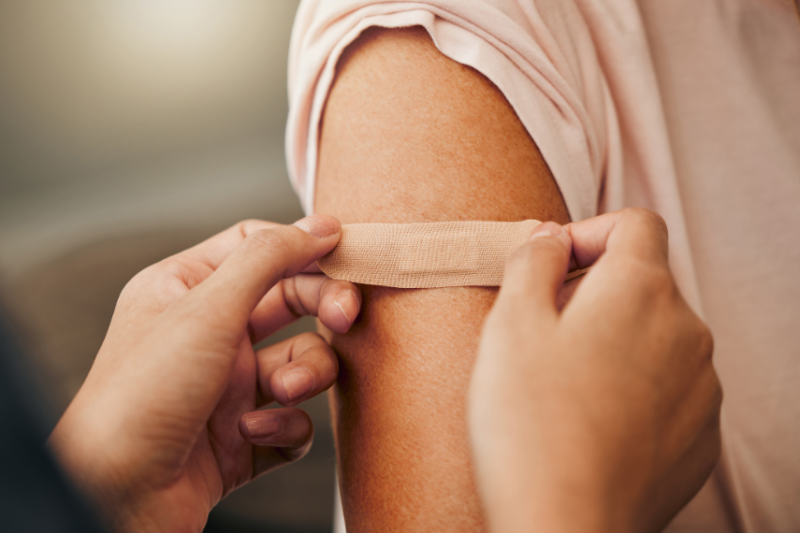
If you’re travelling abroad, you should know which vaccines you need for your destination. We’ve broken down everything you need to know about getting the right travel vaccinations, depending on where you’re going.
What is a vaccine?
A vaccine is a substance which makes the body produce antibodies against a certain illness or disease.
It can be made from a small dose of the disease or a synthetic version. It’s designed to make your body have an immune response without causing symptoms.
Why do I need travel vaccinations?
In the UK, you need routine vaccinations, like measles or mumps, but they don’t protect you from overseas diseases.
If you’re travelling abroad, it’s important to check what vaccinations you may need for the country you’re going to.
You might be more at risk of developing illnesses abroad if you:
- are travelling in rural areas
- are backpacking
- are camping or staying in hostels
- have a pre-existing health condition
When should I get my travel vaccinations?
If you need to book vaccines for travel, you should make an appointment with your doctor or travel clinic at least eight weeks before you travel.
Some vaccinations need multiple doses, and your body needs time to develop immunity.
Before having any vaccines for your holiday, make sure your GP is aware if you:
- are pregnant or think you might be pregnant
- are breastfeeding
- have an immune deficiency
- have any allergies
Where do I get travel vaccinations?
Before booking an appointment, call or visit your doctor’s surgery to check if you’re up to date with your routine vaccinations.
If you have records of previous vaccinations for travelling abroad, let your doctor know.
The next step is to find out if your GP is signed up to offer free NHS travel vaccinations: some vaccines aren’t free and available on the NHS.
If they are, make an appointment. If they aren’t, you could try a private clinic or a pharmacy offering travel healthcare services.
How much are travel vaccinations?
The cost of travel vaccines depends on which country you’re travelling to and the diseases you need vaccinating against.
Some are freely available on the NHS, but you will have to pay for others.
If your vaccinations aren’t available on the NHS, ask your doctor for the following details:
- written information on the necessary vaccines
- how much the dose or course costs
- any other charges, such as for a certificate of vaccination
Free travel vaccinations available on the NHS include:
- polio (given as a combined diphtheria/tetanus/polio jab)
- typhoid
- hepatitis A
- cholera
These diseases are vaccinated against for free as they’re the riskiest to public health if they’re brought into the country.
Vaccinations you’ll need to pay for include:
- hepatitis B
- Japanese encephalitis
- meningitis
- rabies
- tick-borne encephalitis
- tuberculosis (TB)
- yellow fever – only available from specific Yellow Fever Vaccination Centres (YFVCs)
Will my travel insurance cover me if I become ill and haven’t had the relevant vaccine?
If the vaccination would have prevented an illness you get abroad, you won’t be covered by travel insurance.
It’s important to follow the advice of the Foreign, Commonwealth and Development Office (FCDO) and your doctor.
This includes getting all recommended vaccinations and inoculations and taking enough of your prescription medication with you to cover the time you’re away.
What vaccinations do I need?
The vaccinations you’ll need depends how when you’re going and the type of areas you may visit in that country.
For a full list of countries and the vaccinations you need for each, check out:
Travel vaccinations by country
We’ve listed some of the countries you’ll need specific vaccinations for below.
You can check what vaccinations you need for a country by checking NHS Fit for Travel but if you’re unsure, speak to a medical professional.
Turkey
Vaccines usually recommended:
- none
Other vaccines to consider:
- hepatitis A
- hepatitis B
- rabies
- tetanus
For individuals at highest risk:
- none
India
Vaccines usually recommended:
- diphtheria
- hepatitis A
- tetanus
- typhoid
Other vaccines to consider:
- hepatitis B
- rabies
For individuals at highest risk:
- cholera
- Japanese encephalitis
Yellow fever vaccination certificate requirements in India are very specific, and you can read more on the World Health Organisation (WHO) website.
Mexico
Vaccines usually recommended:
- none
Other vaccines to consider:
- diphtheria
- hepatitis A
- rabies
- tetanus
- typhoid
For individuals at highest risk:
- hepatitis B
Thailand
Vaccines usually recommended:
- none
Other vaccines to consider:
- diphtheria
- hepatitis A
- hepatitis B
- rabies
- tetanus
- typhoid
For individuals at highest risk:
- Japanese encephalitis
A yellow fever vaccination certificate is required for travellers nine months old or over arriving from countries with risk of yellow fever transmission, or anyone who came via a country with a risk of yellow fever transmission.
Vietnam
Vaccines usually recommended:
- diphtheria
- tetanus
Other vaccines to consider:
- hepatitis A
- hepatitis B
- rabies
- typhoid
For individuals at highest risk:
- Japanese encephalitis
Egypt
Vaccines usually recommended:
- poliomyelitis
- tetanus
Other vaccines to consider:
- hepatitis A
- hepatitis B
- rabies
- typhoid
A yellow fever vaccination certificate is required for travellers nine months old or over arriving from countries with risk of yellow fever transmission.
South Africa
Vaccines usually recommended:
- diphtheria
- hepatitis A
Other vaccines to consider:
- hepatitis B
- rabies
- tetanus
- typhoid
A yellow fever vaccination certificate is required for travellers one year or over arriving from countries with risk of yellow fever transmission, or anyone who spent more than 12 hours in a country with risk of yellow fever transmission.
Cuba
Vaccines usually recommended:
- none
Other vaccines to consider:
- hepatitis A
- rabies
- tetanus
For individuals at highest risk:
- hepatitis B
A yellow fever vaccination certificate is required for travellers nine months old or over arriving from countries with risk of yellow fever transmission, or anyone who spent more than 12 hours in a country with risk of yellow fever transmission.
China
Vaccines usually recommended:
- poliomyelitis
Other vaccines to consider:
- hepatitis A
- hepatitis B
- rabies
- tetanus
- tick-borne encephalitis
- typhoid
For individuals at highest risk:
- cholera
- Japanese encephalitis
A yellow fever vaccination certificate is required for travellers over nine months old arriving from countries with risk of yellow fever transmission, or anyone who came via a country with risk of yellow fever transmission.
This doesn’t apply if you’re only travelling to Hong Kong and Macao.
Japan
Vaccines usually recommended:
- none
Other vaccines to consider:
- hepatitis B
- tetanus
For individuals at highest risk:
- hepatitis A
- Japanese encephalitis
- tick-borne encephalitis
Travel vaccinations by disease
Cholera
Most travellers don’t need a cholera vaccine. Aid workers or people who’ll have limited access to medical treatment will sometimes need it.
Cholera is generally an issue in areas which may have poor sanitation, such as:
- Sub-Saharan Africa
- South and southeast Asia
- the Middle East
- Central America and the Caribbean
The vaccine is usually taken as a drink in two doses one to six weeks apart. Take the final dose at least a week before you travel.
Diphtheria
The diphtheria vaccine protects against diphtheria, tetanus and polio. It’s sometimes known as the dtap vaccine or tdap vaccine.
It’s routinely given to children in the UK. You may need a booster if it’s been more than 10 years and if you’re travelling somewhere diphtheria is widespread such as:
- Africa
- South Asia
- former Soviet Union
Any boosters are usually a single three-in-one injection.
Hepatitis A
The hepatitis A vaccine is recommended when travelling to certain countries that may have areas with poor hygiene and sanitation, such as:
- Sub-Saharan Africa
- Asia
- the Middle East
- South and Central America
A single hepatitis A injection is given initially, with a second booster six to 12 months later. This should cover you for 20 years.
You can also get a combined hepatitis A and B vaccine if required.
Hepatitis B
The hepatitis B vaccine is usually offered to people travelling to places such as:
- Africa
- Asia
- the Middle East
- southern and eastern Europe
Hepatitis B spreads through blood and bodily fluids, so having sex and playing contact sports can increase your risk of getting it.
The hepatitis B immunisation involves a course of three injections which can be spread over any period from three weeks to six months.
Japanese encephalitis
The Japanese encephalitis vaccine is recommended for anyone planning to stay for at least a month in Asia.
It’s also recommended for the Pacific islands and northern Australia. It’s rare in Japan now due to immunisation programmes.
The Japanese encephalitis vaccination has two injections 28 days apart.
Meningococcal meningitis
The meningococcal meningitis (MenACWY) vaccine is usually recommended for people travelling to parts of Africa or Saudi Arabia, particularly during Hajj or Umrah.
You need it if you’re travelling for a long time and have close contact with the local people.
It’s a single injection given two to three weeks before you travel.
Polio
The polio vaccine is routinely given to children in the UK as part of the diphtheria, polio and tetanus vaccination.
However, if you’re travelling to places such as Pakistan, Afghanistan or Nigeria, and your last injection was more than 10 years ago, you may need a booster.
Rabies
Rabies is found all over the world – look at the list of countries for more information. The rabies vaccine is recommended if you’re travelling to an at-risk area, particularly if you’re:
- staying for at least a month
- unable to get quick access to medical facilities
- doing activities that increase your risk of rabies (for example cycling and running)
The rabies vaccination involves three injections over a period of 28 days.
Tetanus
The tetanus vaccine is available as part of a combined vaccination for diphtheria, tetanus and polio, which is routinely given to children in the UK.
A booster is usually only recommended if you’re travelling somewhere with limited medical services, or it’s been 10 years since your last dose.
Tick-borne encephalitis (TBE)
The tick-borne encephalitis vaccine is usually recommended for people living or working in high-risk areas, or planning to hike or camp in these areas during spring or summer.
High-risk areas include:
- central, eastern, and northern Europe
- eastern Russia
- certain countries in east Asia such as China and Japan
The vaccination is made up of three injections. The first injection is given, followed by a second dose one to three months later and a third dose five to 12 months after that.
The full course TBE vaccine offers protection for up to three years, after which you’ll need a booster if required.
Tuberculosis (TB)
The tuberculosis or TB vaccine is given to those thought to be at increased risk of the disease.
It’s recommended for those under 16 who’ll be living or working in a country where TB is common:
- Bangladesh
- Pakistan
- India
- Africa
- parts of South and Southeast Asia
- parts of South and Central America
- parts of the Middle East
The TB vaccine is given as a single injection often known as a BCG.
Typhoid
The typhoid vaccine is advised if you’re travelling to areas like:
- Bangladesh
- Pakistan
- India
- Africa
- parts of south and southeast Asia
- parts of South and Central America
- parts of the Middle East
It’s important if you’re going to be staying or working with local people in areas where sanitation and food hygiene are poor.
Two vaccines are available: a single typhoid injection and a course of three capsules, both of which should ideally be taken a month before you travel.
You’ll then need a booster every three years if you’re still at risk.
Yellow Fever
The yellow fever vaccine is recommended if you’re travelling to high-risk areas such as:
- tropical Africa
- central and South America
A single dose of the yellow fever injection taken at least 10 days before travelling is thought to offer lifelong protection – a booster is no longer necessary for most people.
You’ll be given an International Certificate of Vaccination or Prophylaxis when you have your yellow fever jab.
This is required for entry to certain countries, so make sure you keep this safe as it’s valid for life. You’ll need a certificate to enter:
- Eritrea
- Rwanda
- Somalia
- United Republic of Tanzania
- Zambia
Without a certificate, you’ll be kept in quarantine for up to six days after arriving from the at-risk country.


